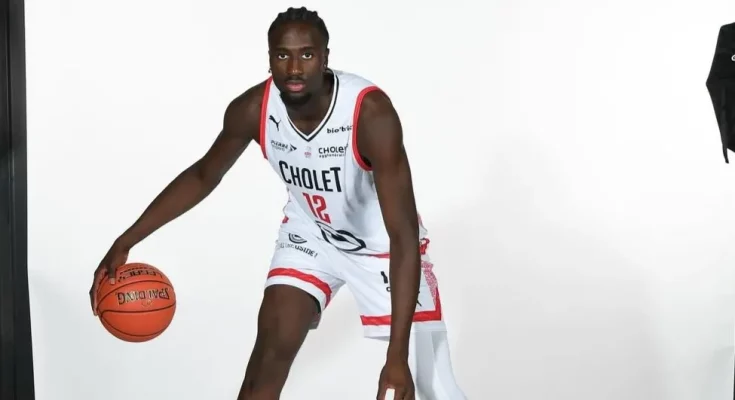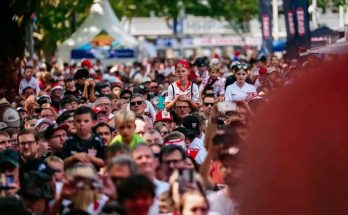A few minutes ago, the New York Knicks made an intriguing addition to their roster by selecting forward Mohamed Diawara with the 51st overall pick in the second round of the 2025 NBA Draft. This move was not one that many casual fans had circled or even anticipated, but for those who have followed Diawara’s unconventional journey, it is a validation of persistence, versatility, and the increasingly global nature of NBA scouting. The 6’9” forward from France has carved a unique path to the league, blending raw athleticism with developing skills and a professional mentality that stood out to scouts during international showcases and private team workouts. For the Knicks, this selection signals both a strategic investment in the future and an endorsement of a player they believe could blossom into a high-impact contributor with the right development infrastructure.
Mohamed Diawara’s rise to the NBA has not been meteoric in the traditional sense. He wasn’t a five-star recruit out of a high-profile American prep academy nor was he the centerpiece of a blue-blood NCAA program. Rather, Diawara built his profile through a combination of standout performances in France’s top junior leagues, a brief but impactful stint in the Basketball Champions League, and steady production for Paris Basketball in the LNB Pro A. Scouts noted his potential as early as 2022, but it was during the 2024-2025 season that his game took a leap—defensively, Diawara matured into a multi-positional stopper with quick feet, long arms, and impressive timing as a weakside shot blocker. Offensively, while his shooting remains a work in progress, he flashed encouraging signs of growth, particularly in his ability to create off the dribble, finish through contact, and make the right reads in transition.
The Knicks’ front office, led by President Leon Rose and General Manager Scott Perry, had reportedly been keeping tabs on Diawara since last summer. According to league insiders, New York’s international scouts had identified him as a high-upside project who could develop into a rotational forward if placed in the right system. Their confidence grew after Diawara impressed at the NBA Draft Combine in Chicago, showcasing improved shooting mechanics, fluidity in drills, and a surprisingly mature understanding of defensive rotations during scrimmages. While he didn’t dominate in any one area, his all-around game, combined with his physical profile and age—he only recently turned 20—made him a desirable target for teams seeking long-term assets with upside beyond their draft slot.
When the 51st pick came around, several notable names were still on the board, including collegiate stars with more polished offensive résumés. However, the Knicks prioritized what they saw as untapped two-way potential and selected Diawara without hesitation. The front office cited his combination of size, switchability, and work ethic as major reasons behind the selection. They believe he can develop into a modern NBA forward capable of guarding multiple positions, pushing the pace, and eventually spacing the floor as his jumper evolves.
The selection also aligns with New York’s broader strategy of balancing veteran leadership with youthful energy. The Knicks, who made a strong playoff run in the 2024 postseason before being eliminated in the Eastern Conference semifinals, are poised to contend in the near future but are also acutely aware of the need to build sustainable success through the draft. Diawara joins a young core that includes players like Quentin Grimes, Miles McBride, and rookie phenom Amaré Bailey, giving the Knicks another piece to mold under head coach Tom Thibodeau’s development-focused system.
For Diawara himself, the moment marks the culmination of years of sacrifice, discipline, and self-belief. Born in Bamako, Mali before moving to France with his family as a young child, he began playing basketball at the age of 10 in the suburbs of Paris. Initially more inclined toward soccer, Diawara’s height and athletic gifts made him a natural fit for the hardwood. He quickly caught the attention of coaches at INSEP, France’s premier sports academy, which has produced NBA players like Tony Parker, Evan Fournier, and Killian Hayes. Under the tutelage of world-class trainers and alongside elite European peers, Diawara began crafting his game with a focus on fundamentals and team play. Despite occasional struggles with consistency and decision-making in his teenage years, his upside was undeniable, and by 2023, he had become a regular in France’s U20 national team setup.
One of the most striking aspects of Diawara’s game is his defensive versatility. At 6’9” with a 7’1” wingspan, he has the frame and mobility to guard players across the 2-through-5 positions. His foot speed allows him to stay in front of quicker wings, while his strength and anticipation make him a problem for bigs who try to post him up. He’s particularly effective as a help defender—able to rotate from the weak side for timely contests or shot blocks. This kind of defensive IQ and commitment is something the Knicks have been emphasizing, especially with Thibodeau’s well-known defensive schemes that demand cohesion and effort. Diawara is expected to thrive in that structure and may even earn early minutes during the regular season if he adjusts quickly to the NBA pace.
Offensively, Diawara is still raw, but he has shown enough flashes to suggest a promising ceiling. His handle is tight enough to attack closeouts, and he’s shown an emerging ability to finish through traffic with either hand. In transition, he’s dangerous—he runs the floor like a wing and can finish above the rim with ease. His three-point shot is still inconsistent, but recent improvements in form and confidence have scouts optimistic. He shot 32% from deep last season on moderate volume, but it was his mechanics during the Combine and pre-draft workouts that really turned heads. If he can become a league-average shooter, his value on both ends skyrockets. The Knicks development staff, which has done wonders with players like Immanuel Quickley and Mitchell Robinson, will look to mold Diawara’s offensive skillset while preserving his defensive instincts and hustle.
There are, of course, challenges ahead. The transition from European basketball to the NBA is notoriously difficult, especially for players selected in the second round. The game is faster, the players are stronger, and the margin for error is razor-thin. But Diawara has already shown an ability to adapt and grow. His time in Paris taught him how to compete against grown men in a professional setting, while his international experience has given him a taste of the pressure and physicality that come with high-stakes basketball. Perhaps more importantly, his humility and coachability have made him a favorite among teammates and coaches alike. He is known for being the first in the gym and the last to leave, a trait that bodes well for his development.
Another factor working in Diawara’s favor is the evolving nature of the modern NBA, which increasingly values switchable defenders, positional fluidity, and size on the perimeter. Players like OG Anunoby, Jaden McDaniels, and Deni Avdija have shown that non-traditional scorers can still carve out valuable roles on winning teams. Diawara’s pathway may mirror that mold—defense-first wings who gradually expand their offensive arsenal while contributing to team success in less glamorous but vital ways. If he can embrace that role early, there’s a real chance he could exceed the expectations typically associated with a late second-round pick.
The Knicks organization also has the option of stashing Diawara overseas for another season or assigning him to their G League affiliate, the Westchester Knicks, for more development. That decision will likely hinge on his performance during Summer League and training camp. Early reports suggest he’ll join the Knicks for Las Vegas Summer League in August, where he will have the opportunity to showcase his growth against similarly hungry rookies and fringe NBA players. That stretch will be a key evaluation period for the coaching staff, offering a glimpse into how quickly he can adjust to the physicality, spacing, and pace of NBA-style basketball.
As the dust settles from the 2025 NBA Draft, the selection of Mohamed Diawara at No. 51 may not dominate headlines or social media chatter, but it represents a calculated and intelligent swing on potential. In a league that increasingly rewards development, upside, and versatility, the Knicks have added a player who embodies those qualities. Time will tell whether Diawara blossoms into a core piece of New York’s future or simply adds depth to their rotation, but for now, he wears the blue and orange with pride, ready to prove he belongs on basketball’s biggest stage. And for a franchise constantly balancing the weight of history with the hunger for present-day relevance, Diawara might just be a name worth remembering.



